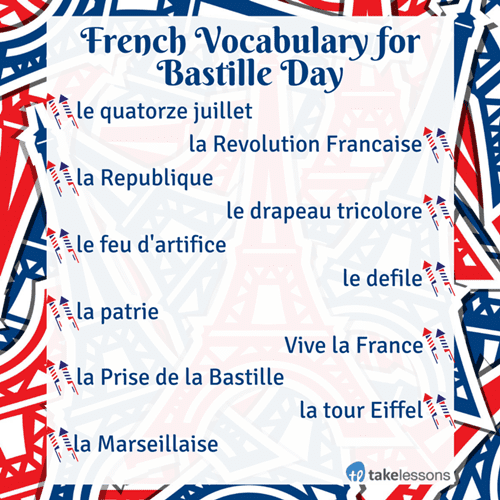Perhaps you’ve heard of Bastille Day, the French national holiday in July. Tutor Annie A. shares history and vocabulary to help you observe this holiday like the French do…
Are you planning on celebrating Bastille Day this year? If so, you’ll need to learn some French vocabulary related to the holiday!
In this blog post, we’ll list the French vocabulary words and phrases that will help you get in the spirit of la fête nationale.
Vive la France!
What Do the French Say on Bastille Day?
On Bastille Day, the French National Day, you might hear the following:
- “Vive la France!”, meaning “Long live France!”
- ” Vive la République!”, meaning “Long live the Republic!”.
- the French national anthem, “La Marseillaise”, being sung or played
The lyrics to “La Marseillaise” were written in 1792 by Claude Joseph Rouget de Lisle, a French army captain, during the Siege of Strasbourg. The song quickly became popular with French troops, and it was adopted as the national anthem in 1795.
Want to learn more about French vocabulary and culture? Be sure to sign up for French lessons! It’s the best way to get a handle on this unique and beautiful culture. And be sure to check out plenty of videos like the ones you see below:
https://www.youtube.com/watch?v=y7mviFfvHhk
What is the History of Bastille Day?
Bastille Day, or le quatorze juillet as they say in France, commemorates the storming of Bastille on July 14, 1789 by the French masses.
The Bastille was a fortified prison where political prisoners were usually kept – some even without the formality of a trial. There were seven prisoners on that fateful July 14 when a crowd of angry and determined Frenchmen forced the gates open and released them.
This was the beginning of the French Revolution. Within twenty days, feudalism was abolished and a little later the Declaration of the Rights of Man and Citizen was proclaimed.
Prior to the French revolution, French society was divided into three very distinct classes: the clergy, known as the first estate, the nobility, or the second estate, and finally the third estate, the common people. The clergy and nobility were the smallest and also the richest classes, while the third estate lived in extreme poverty.
For the French populace, the Bastille stood as a symbol of the corruption behind the wealth and power of the clergy and nobility. When the common people initiated the revolution, it symbolized the end of absolute monarchy and the beginning of the French Republic.
When Was Bastille Day Declared the National Holiday?
It was in 1880 that July 14th was chosen as a national holiday, or Fête Nationale.
Since then, it has been celebrated with military parades, firework displays, and other public festivities.
Each year, on this joyous occasion, the people of France come together to celebrate their country’s history and to reaffirm their commitment to liberty and justice for all.
How is Bastille Day Celebrated in France?
The French celebrate Bastille Day with a lot of fervor and gusto. On the morning of le quatorze juillet, a multitude gathers at the Champs Élysées, waiting for the oldest and the largest military parade in Europe. The President of the French Republic attends the event which consists of both the parade of troops on foot, mounted troops, and motorized troops.
The spectacular firework display to celebrate the occasion starts in the evening, usually around 11:00 pm, and lasts for about thirty minutes. The fireworks in Paris are particularly captivating; the resplendent Eiffel Tower glows in the mist as the decorative ponds of Trocadéro reflect bright balls of fire.
Another amazing event is a big concert by the Orchestre Nationale de la France which takes place at the foot of the Eiffel Tower and stars renowned, international artists. This is a free event that takes on a new theme each year.
The Firemen’s Ball in selected fire stations is another interesting activity, and the festivities can last until 4:00 am. There may be an entrance fee or a donation requested to improve the working condition of the staff.
Interestingly the Bastille Day celebrations are held in other countries. Belgium, the Czech Republic, Hungary, United Kingdom, and United States of America, among others celebrate this day each year. Over fifty cities in USA have events to mark the occasion.
Baltimore, Boston, Chicago, Dallas, Houston, Milwaukee, Minneapolis, New Orleans, New York City, Orlando, Philadelphia, Portland, Sacramento, San Francisco, Seattle, and St. Louis have different kind of festivals. These events are typically organized with the help of the French Cultural Center or Alliance Française located in these cities. Mostly the festivities revolve around fine wining and dining.
What Are Some French Vocabulary Words for Bastille Day?
Now let’s take a look at some French vocabulary related to the Bastille Day.
What is the French Word for Bastille?
First of all, Bastille Day is called le quatorze juillet or la fête nationale. You do not wish a Happy Bastille Day in French. It’s not the custom.
Many people get Bastille Day confused with “bastille” in general. The French word for Bastille is la Bastille. The Bastille was a fortress used as a prison in Paris, France. It was built in the 14th century to defend the city from attack.
The Bastille became a symbol of the power of the French monarchy. In 1789, during the French Revolution, the people of Paris stormed the Bastille and freed the prisoners. The Bastille was demolished soon after. Its stones were used to build a monument that stands in Paris today.
The French word for “Bastille” is still used to describe a place where people are kept against their will, such as a prison. It can also be used to describe any stronghold or fortification.
What is Bonne Fete Nationale?

Other French Vocabulary Words for Bastille Day
The French Revolution is la Revolution Francaise.
Republic is la Republique.
The French flag is le drapeau tricolore.
Fireworks are le feu d’artifice.
A military parade is le defile.
The homeland is la patrie.
Long Live France is Vive la France.
The Storming of the Bastille is la Prise de la Bastille.
The Eiffel Tower is la tour Eiffel.
The French national anthem is “La Marseillaise“.
French Revolution Vocabulary
Interested in learning more vocabulary in French?
The French Revolution was a time of great upheaval and change in France. A large number of new vocabulary words were coined during this period to describe the new ideas and concepts that were being proposed.
Some of these new terms included “liberty,” “equality,” and “fraternity.” These words were used to describe the goal of the Revolution, which was to create a fairer and more just society. Other vocabulary words that were coined during the French Revolution include “nationalism,” “democracy,” and “secularism.”
These words describe the various political philosophies that emerged during this period. The French Revolution was also responsible for introducing a number of new words into the English language, such as “Danton,” “Robespierre,” and “Ancien Régime.”
What is the Best Way to Learn French Vocabulary?
There are many different ways to learn French vocabulary, and the best method depends on the individual learner.
Some people find that they learn best by using French vocabulary flashcards, while others prefer to listen to audio recordings of native speakers. There are also a number of online resources that can be helpful for learning French vocabulary.
One way to find out what method works best for you is to experiment with different techniques and see which one helps you to remember the vocabulary most effectively.
Learning French vocabulary can seem like a daunting task, but there are a few tricks that can make it easier. One is to find a good French vocabulary list and use it as a starting point. There are many different lists available online, so take some time to find one that covers the topics you’re interested in or that includes words that you’re likely to use often.
Once you’ve found a list, try to memorize at least a few new words each day. You can also make things more interesting by creating your own sentences with the new vocabulary or by looking up the words in a dictionary and learning about their origins. With a little effort, you’ll be surprised at how quickly your French vocabulary improves.
Whichever method you choose, it is important to be consistent in your studies and to review the vocabulary regularly in order to ensure that you retain what you have learned.
What Was the Slogan of the French Revolution?
The French Revolution was a time of great political and social turmoil in France.
One of the most famous slogans of the Revolution was “Liberté, égalité, fraternité,” which translates to “liberty, equality, fraternity.” This slogan encapsulated the goals of the Revolution: to overthrow the existing monarchy and give power to the people, to create a more equal society without the privilege of the nobility, and to establish a sense of brotherhood among all Frenchmen.
The slogan is still widely used today in both France and other countries as a symbol of these values.
Learn French Vocabulary With These French Vocabulary Lists
So go ahead and celebrate la Fête Nationale with some of the most beautiful French vocabulary words. And don’t forget, if you ever need a refresher on these words or want to learn more, we’ve got you covered!
Learning a new language can be intimidating, but it’s definitely worth it – not only will your Francophone skills make you the life of any party, they could also come in handy when traveling to France (or other French-speaking countries). Bonne chance et à bientôt!
Now that you have a bit of history and vocabulary, you can celebrate Bastille Day in the French fashion. Vive la France!
 Post Author: Annie A.
Post Author: Annie A.Annie A. is a French instructor whose lessons are conducted exclusively online. Teaching for the past 12 years, she found her passion for the language while studying in Paris as a teenager. Learn more about Annie here!
Photos via Yann Caradec, USAFE AFAFRICA, Lebara Mobile
Megan L.

